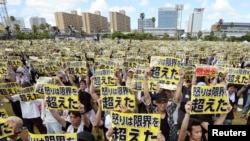Tens of thousands of demonstrators have gathered on the Japanese island of Okinawa demanding the U.S. military shut down its bases there following a rash of high-profile incidents involving service members that have made headlines in recent months.
Protesters at Sunday's rally want a plan to move a U.S. base from one part of the island to another scrapped altogether.
Dissatisfaction with the U.S. military bases on the island has been brewing for years.
The U.S. Navy said earlier this month it has banned its personnel in Japan from drinking and restricted off-base activities after a sailor in Okinawa was arrested on suspicion of drunk driving. Petty Officer Aimee Mejia was arrested after she allegedly drove on the wrong side of a freeway and crashed her car into two vehicles, slightly injuring two people.
Following the drunk driving episode, U.S. sailors throughout the entire country were banned from drinking alcohol indefinitely.
The U.S. Navy had already instituted a midnight curfew for sailors and banned off-base drinking after a former U.S. Marine who worked on an American military base in Japan was arrested last month for alleged involvement in the disappearance of a Japanese woman police believe was raped and murdered.
The original plan to move the U.S. base dates back to 1996 when the two countries agreed to close the Futenma air base located in a residential urban area after the rape of a 12-year-old Japanese girl by three U.S. military personnel. That led to mass demonstrations, and the move has been on hold since as residents near the new less-populated location protest against potential noise, pollution and crime.
Japanese Prime Minister Shinzo Abe's popularity has dipped in the region in part because he is in favor of the relocation rather than removing all U.S. military personnel from Okinawa, as called for by the island's governor.
Okinawa was the site of some of the bloodiest fighting between the U.S. and Japan during World War Two and was followed by a 27-year American occupation of the island.






